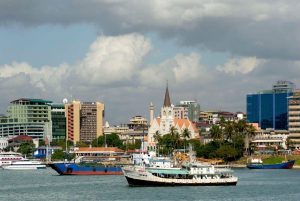Kenya and Dubai-based Emirates airline are caught in a row over a push for additional flights into Nairobi, heightening risk of a fresh diplomatic tiff with the United Arab Emirates (UAE).
Transport Cabinet Secretary James Macharia claimed that the airline and the director-general of the aviation authority in Dubai had written to him “very offending” letters in a bid to arm-twist Kenya into allowing more flight frequencies by the Emirati carrier.
“We got a letter recently from the director general, Civil Aviation of Dubai and not one written by United Arab Emirates (UAE) Minister. They told us not to fly aircraft that has capacity of more than 220 seats to Dubai but they fly into Kenya aircraft with more than 400 seats,” he told members of the Senate committee on Roads and Transportation on Wednesday.
“When we receive this kind of letters, they send a wrong message in terms of tactics the airline is using and shows that they do not respect Kenya,” the CS added.
The latest stand-off rekindles memories of a spat about a decade ago when Kenya and the UAE were caught in retaliatory travel restrictions for their citizens. The 2010 feud between these countries was triggered by an incident in which Kenyan immigration officials erroneously deported four members of Dubai’s royal family.
The four royals were detained for lacking proper entry visas in Mombasa, interrogated for hours before being returned to Dubai amid claims that they were terror suspects.
Dubai retaliated by imposing restrictions requiring all Kenyans entering the UAE to present proof of higher education in order to obtain a visa. This triggered fear of deportation among thousands of Kenyans working in the Gulf nation, prompting truce talks.
Mr Macharia said Emirates that does 14 weekly flights to Nairobi was seeking additional daily frequencies, a request that Kenya is opposed to because of the skewed advantage in favour of airlines from the Gulf region.
“When you add Etihad Airlines and Air Arabia, in total they have 28 weekly flight frequencies against Kenya Airways’ seven,” he said.
The CS said Emirates Airlines, Etihad Airlines and Air Arabia—all designated to fly from the UAE—currently have a combined weekly seat capacity of 15,400 against Kenya Airways’ 5,510.
“Giving them (Emirates) more flight capacity means they will get 90 percent of business between Nairobi and Dubai while KQ gets 10 percent. This is not tenable,” he said in response to questions filed by Makueni Senator Mutula Kilonzo Jnr.
Mr Macharia told legislators that the government had a special interest in KQ by virtue of a Sh75 billion loan guarantee to the airline and would protect it from any threats on its survival.
“However, much they (Emirates) lobby, as Cabinet Secretary for Transport, I will not approve additional seats or flights frequencies for the UAE airlines,” he said.
The CS said the government’s decision is also informed by the number of passengers which went down as a result of Covid-19 pandemic.
“Every airline is struggling. Giving Emirates additional frequencies will compound a difficult situation. We shall not agree even if they continue lobbying because this is not tenable,” Mr Macharia said.
He said Emirates Airlines benefits from substantial government subsidy and is, therefore, capable of selling out the seats in Nairobi-Dubai route at throw-away prices due to the subsidy.
He said only the national career, KQ, can protect Kenya’s national interests in terms of emergencies.
“When Covid-19 struck, we looked for airlines to evacuate our people but only KQ came in handy. We had to change configuration of two KQ planes 747 to help us ship in vaccines because no airline wanted to help us,” Mr Macharia said.
He said KQ, as Kenya Airways is known by its international code, is a corporate entity that impacts heavily on the country’s economy particularly in tourism and movement of horticultural products including flowers. “When it comes to protection, we can’t hesitate to protect KQ,” he said.
In February, KQ said it will need at least $500 million (Sh54.87 billion) in bailouts in the next nine months as it navigates the turbulent aviation sector following collapse in air travel demand amid Covid-19 economic fallout.
Source: Business Daily






